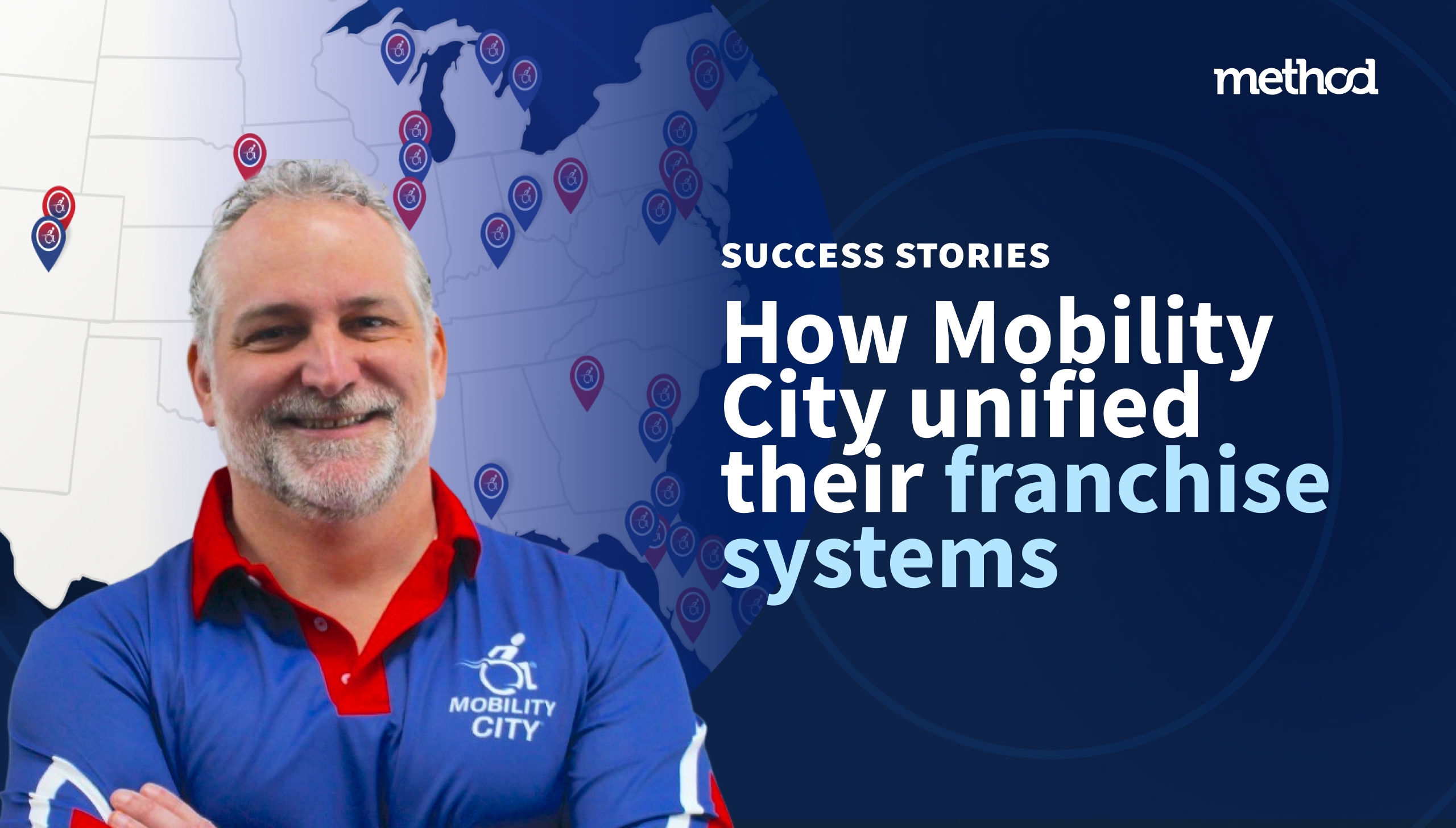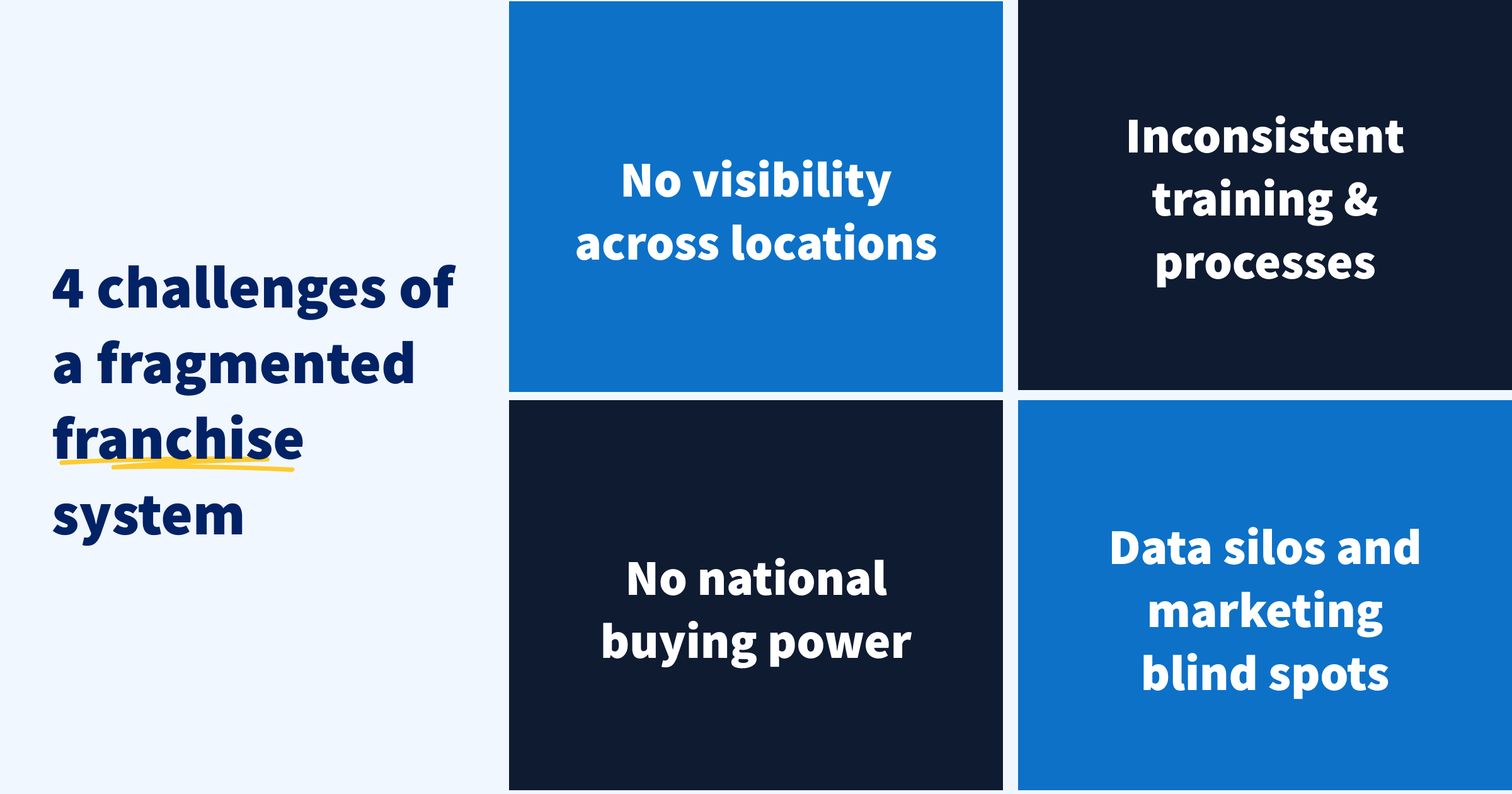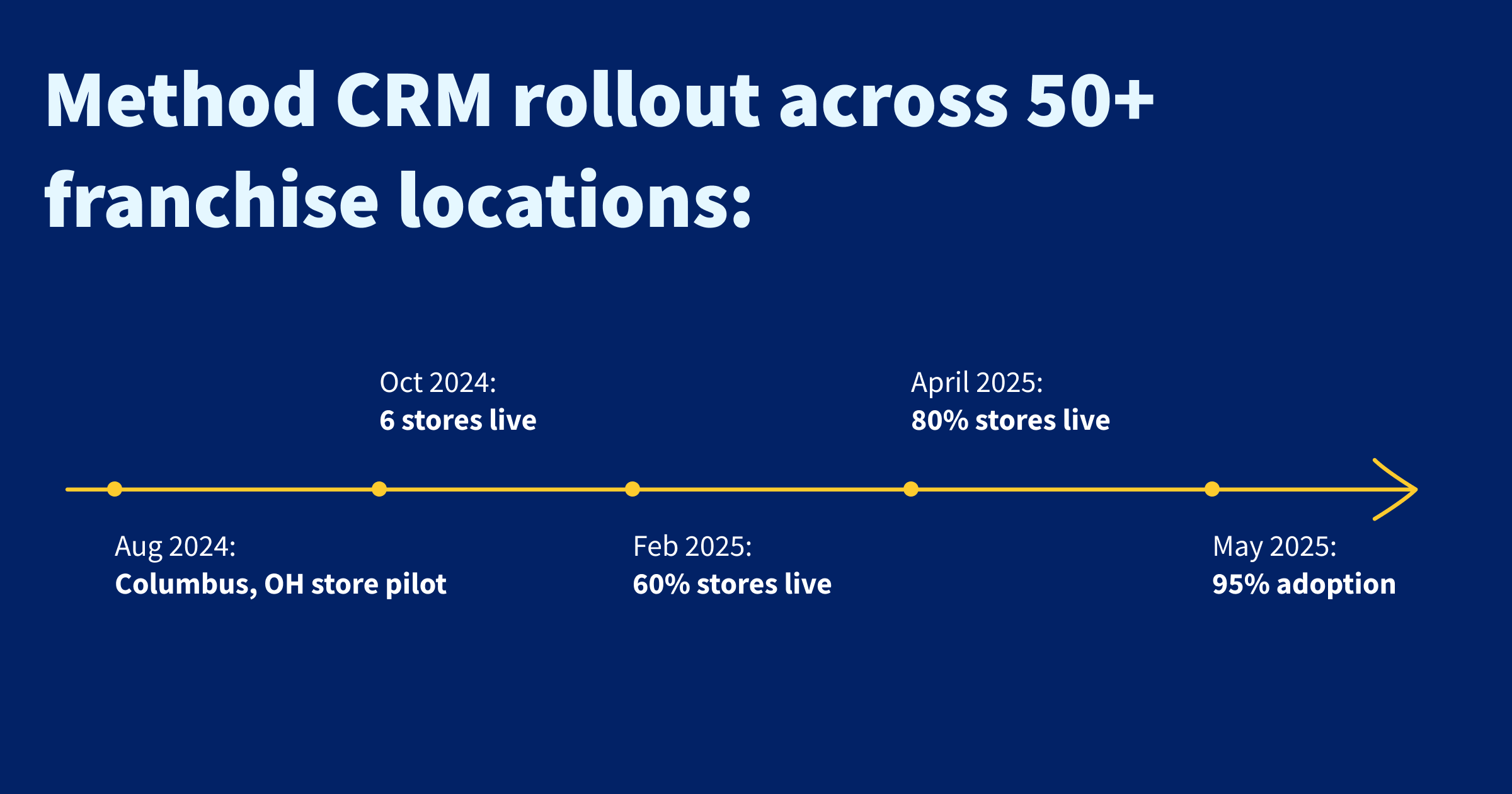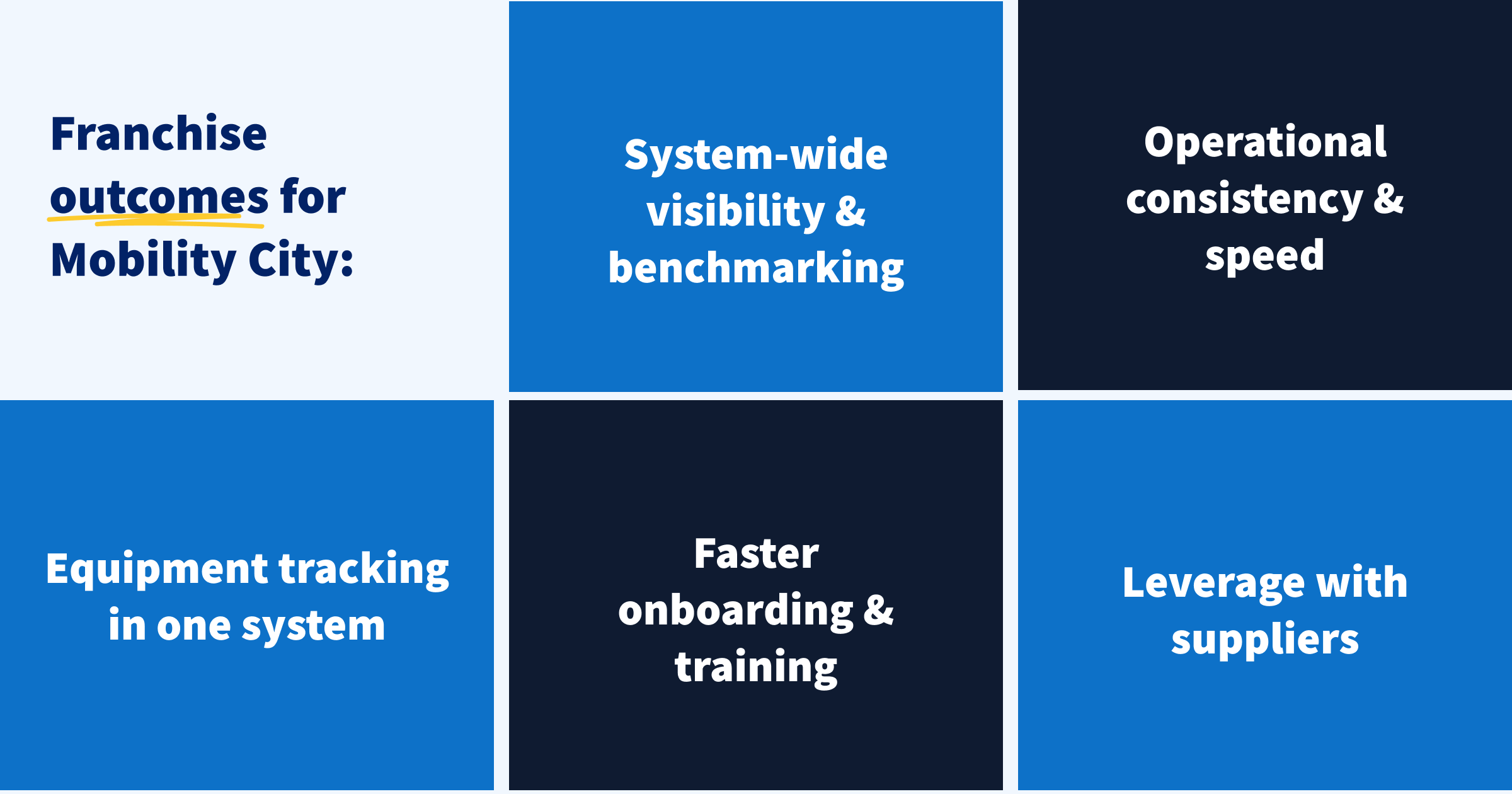How Mobility City unified 50+ franchise systems with Method
Mobility City turned 50+ disconnected franchises into a single, scalable operation with Method. They ditched paper, synced up every location, and laid the groundwork to grow with confidence and efficiency.
Want to see it in action first? Take me there →

95% franchise adoption in under a year
Mobility City rolled out Method across nearly all locations, transforming scattered operations into a unified system.
System-wide performance benchmarking
For the first time, HQ can compare service, sales, and compliance across all franchises—driving smarter decisions.
Buying power unlocked
With consolidated purchasing data, Mobility City now negotiates supplier pricing like an enterprise brand, not 50 small shops.
Mobility City: A franchise business in need of unity
At one Mobility City location, a technician jotted down “Blue Scooter” on a service ticket. Across the country, another logged “Teal Scooter.” Somewhere else? “Revo 2.0 4-Wheel.” Same product, three names, zero consistency. “I have it on a piece of paper somewhere—hold on,” was a refrain heard more often they’d like. Multiply that by 50+ locations and hundreds of products, and you get a clear picture of the chaos Craig Kreakie, Mobility City’s VP of Franchise Operations, was up against when he joined the company.
Mobility City is a national brand that repairs, rents, and sells mobility equipment. With millions in annual sales and a rapidly growing network of franchisees, Mobility City is in the business of freedom—fixing and delivering scooters, wheelchairs, and home accessibility equipment to customers who rely on them. But behind the scenes, things weren’t moving so smoothly.
Each franchise had its own way of doing things. “Some were using QuickBooks, some were still on paper,” Craig explains. There were no shared processes, no centralized data, and no way to ensure a consistent customer experience. What worked in one location, fell apart in another. And with ambitious growth plans on the horizon, that kind of fragmentation wasn’t sustainable.
The challenge: Fragmentation that stunted growth
Mobility City’s growth was impressive. But behind the momentum was a franchise network operating more like a patchwork of mom-and-pop shops than a unified national brand. The cracks were showing, and they were costing the business.

No visibility across locations
At headquarters, Craig couldn’t answer simple questions like “what’s selling best in our system?” Every franchise had their own QuickBooks account, their own items list, and their own naming conventions.
“If Location A and B have sales… it’s all in QuickBooks,” Craig explains, “but every location had their own unique set of items.” There was no way to compare performance or identify trends.
Franchisees, meanwhile, were asking: “Where’s the aggregated value we were promised?”
Inconsistent training and processes
Each store onboarded staff their own way. Some had processes written down. Others relied on shadowing or ad-hoc explanations. With just four to five employees on average, losing one meant a 20-25% hit to the team, and a major operational setback. “Turnover was very painful,” Craig said.
No national buying power
Despite operating 50+ locations, the company had limited leverage with suppliers. Why? Because they had no idea how many units of a product were being sold system-wide. Each franchise ordered stock independently, erasing any opportunity to negotiate for better pricing.
Data silos and marketing blind spots
Without centralized data, the marketing team couldn’t see what was actually working. They couldn’t track product performance, measure campaign ROI, or share best practices.
As a result, franchisors were expressing concern. They were part of the Mobility City system, but where was the value promised?
Because of these gaps, the answer to that question was: “We don’t know.” Mobility City’s franchisors were flying blind. And with plans to scale to 150 to 200 locations, that just wasn’t an option any longer.
The solution: A customized multi-entity CRM to standardize the business
When Craig went looking for a solution to these challenges, he wasn’t shopping for another generic CRM. He needed a platform that could unify all 50+ Mobility City locations while still respecting the uniqueness of a franchise model.
Method CRM checked the boxes. It integrated with QuickBooks. It could scale. And most importantly, it could be tailored at the corporate and franchise levels.
“The big realization was that we could tailor workflows to our franchise needs. We didn’t just plug something in—we built it to fit us.”
– Craig Kreakie, VP of Franchise Operations
That “build” was a full-on collaboration between Mobility City and Method. Working closely with Method’s professional services team, Craig’s team mapped every process from scratch. They pulled in small groups of franchisees to help design standard workflows for repairs, rentals, and sales. What emerged was a single, unified operational model for the business. And Method became the platform to enforce it.
They started with the location near Craig’s home office in Columbus, Ohio. Rollout had the usual ups and downs that come with project management across a dispersed team, but the end result received glowing reviews.
“Monday morning—our busiest day—we flipped the switch,” he recalled. Phones were ringing off the hook. A technician didn’t show up. Everything that could go wrong, did, he said. But still: “The business didn’t shut down. We got through every transaction.” That pilot proved Method could handle the pressure, and that the team could trust it.

From there, Craig rolled out the new system in waves—five locations at a time. Every batch surfaced new areas of the business to standardize and streamline. “We kept finding more and more variations,” he said. “It was eye-opening.” Those discoveries helped fine-tune the system and training. By February 2025, 60% of stores were live. By May, compliance hit 95%.
Behind the scenes, Method became the operational backbone. Every location used the same checklists to service equipment. Sales ran through a centralized POS, feeding clean data into QuickBooks. Rental inventory was tracked in one system, not 50 spreadsheets.
“Over the last 12 months it’s become a standard to use this software in a very specific way… and by doing so, we can measure the work and benchmark across locations.”
– Craig Kreakie, VP of Franchise Operations
Method didn’t just give Mobility City a CRM. It gave them a playbook—and the tools to enforce it. For the first time, Mobility City was operating like a true national brand.
The outcome: A franchise transformed
Today, Mobility City operates like a well-oiled machine, with 50+ locations all following the same playbook. And the numbers prove it.

System-wide visibility, compliance, and benchmarking
With every transaction and workflow tracked in Method, headquarters can now monitor process compliance and performance in real time.
“We can accumulate information and feedback to locations on how they’re doing, benchmarked regionally and nationally,” says Craig.
Stores receive regular performance reports, and for the first time, leadership can see who’s following SOPs, not just who’s hitting sales targets.
Operational consistency and speed
Technicians in Texas now follow the same repair checklist as those in New York.
Multi-step work orders in Method guide every service call, ensuring a consistent customer experience. These digital workflows also feed directly into QuickBooks, cutting down the paperwork-to-invoice cycle.
“It’s already reducing the time it takes to get paid,” Craig notes.
That means less stress for owners, faster billing for the business.
Equipment tracking in one system
Every piece of equipment—repaired or rented—is logged in a centralized database with full history. From wheelchairs to scooters, any franchise can look up what was done, when, and by whom. No more guessing. No more lost paperwork.
Faster onboarding and training
With Method as the operational backbone, every workflow is documented and standardized. “We’ve been able to shorten training times now that we have standards in place,” Craig says.
New staff or new franchisees ramp up faster—and more confidently.
Leverage with suppliers
With system-wide purchasing data, Mobility City finally has a seat at the table. “We’re analyzing what equipment our stores are buying and using that in conversations with suppliers,” Craig shares. Instead of 50 small accounts, vendors now see a unified, national brand—with the buying power to match.
“Technology alone doesn’t fix bad processes,” Craig reflects. “You have to fix the process, then use the tech.”
Method gave them both.
Scaling up the Mobility City way
Mobility City went from 50 independent franchise islands to one unified, data-driven enterprise—all in under a year. With standardized workflows and centralized data, the company now has a repeatable model for success.
Armed with Method CRM, they’re not just keeping up, they’re ready to scale to 150+ locations without losing control. New franchisees can now plug into proven systems from day one.
And those inconsistent scooter names? That’s history. Today, every Mobility City location speaks the same language.
Want to standardize your business process and set yourself up for growth? Speak to a franchise CRM specialist to learn if Method is a fit for you.